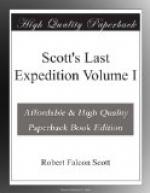I took the opportunity to note hurriedly the few points to which I want attention especially directed. No doubt others will occur to me presently. I think I now understand very well how and why the old surveyors (like Belcher) failed in the early Arctic work.
1. Every officer who takes part in the Southern
Journey ought to have
in his memory the approximate variation
of the compass at various
stages of the journey and to know
how to apply it to obtain a true
course from the compass. The
variation changes very slowly so that
no great effort of memory is required.
2. He ought to know what the true course is to
reach one depot from
another.
3. He should be able to take an observation with the theodolite.
4. He should be able to work out a meridian altitude observation.
5. He could advantageously add to his knowledge
the ability to work
out a longitude observation or an
ex-meridian altitude.
6. He should know how to read the sledgemeter.
7. He should note and remember the error of the
watch he carries and
the rate which is ascertained for
it from time to time.
8. He should assist the surveyor by noting the
coincidences of objects,
the opening out of valleys, the
observation of new peaks, &c._19_
Tuesday, June 13.—A very beautiful day. We revelled in the calm clear moonlight; the temperature has fallen to -26 deg.. The surface of the floe perfect for ski—had a run to South Bay in forenoon and was away on a long circuit around Inaccessible Island in the afternoon. In such weather the cold splendour of the scene is beyond description; everything is satisfying, from the deep purple of the starry sky to the gleaming bergs and the sparkle of the crystals under foot.
Some very brilliant patches of aurora over the southern shoulder of the mountain. Observed an exceedingly bright meteor shoot across the sky to the northward.
On my return found Debenham and Gran back from Cape Armitage. They had intended to start back on Sunday, but were prevented by bad weather; they seemed to have had stronger winds than we.
On arrival at the hut they found poor little ‘Mukaka’ coiled up outside the door, looking pitifully thin and weak, but with enough energy to bark at them.
This dog was run over and dragged for a long way under the sledge runners whilst we were landing stores in January (the 7th). He has never been worth much since, but remained lively in spite of all the hardships of sledging work. At Hut Point he looked a miserable object, as the hair refused to grow on his hindquarters. It seemed as though he could scarcely continue in such a condition, and when the party came back to Cape Evans he was allowed to run free alongside the sledge.
On the arrival of the party I especially asked after the little animal and was told by Demetri that he had returned, but later it transpired that this was a mistake—that he had been missed on the journey and had not turned up again later as was supposed.




